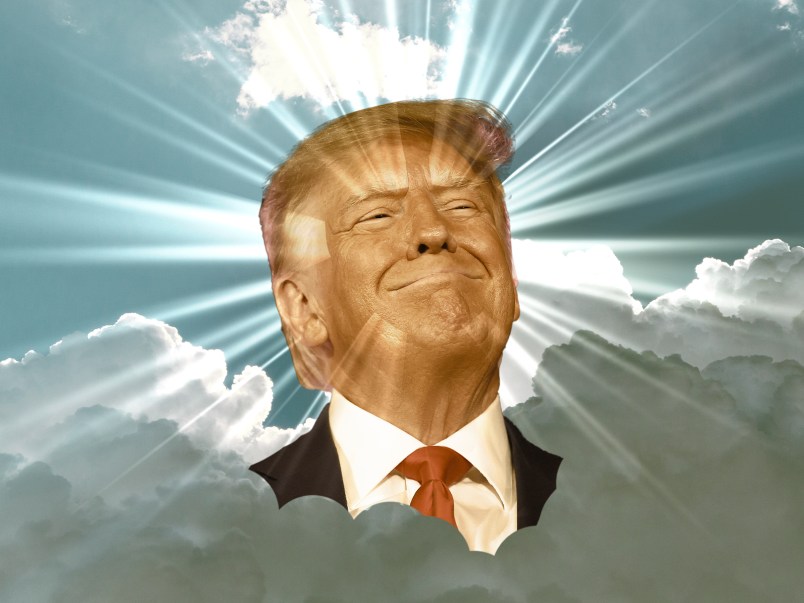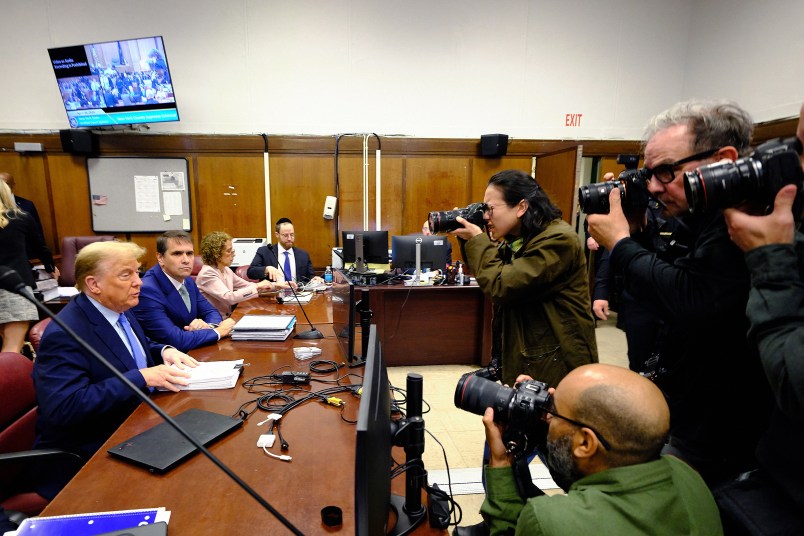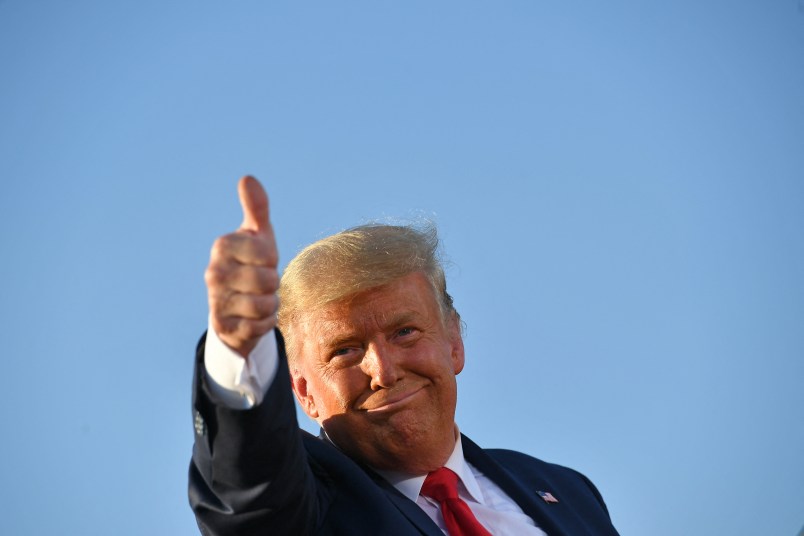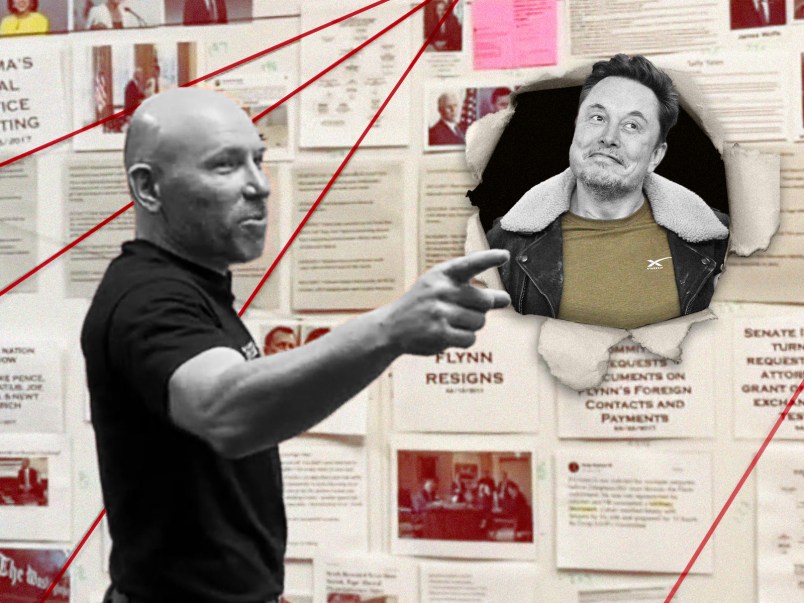I am a journalist who has covered the Christian right for two decades. Over the past three years, I began to more frequently use the term “Christian nationalism” to describe the movement I cover. But I did not start using a new term to suggest its proponents’ ideology had changed. Instead, the term had come into more common usage in the Trump era, now regularly used by academics, journalists, and pro-democracy activists to describe a movement that insists America is a “Christian nation” — that is, an illiberal, nominally democratic theocracy, rather than a pluralistic secular democracy.
To me, the phrase was highly descriptive of the movement I’ve dedicated my career to covering, and neatly encapsulates the core threat the Christian right poses to freedom and equality. From its top leaders and influencers down to the grassroots — politically mobilized white evangelicals, the foot soldiers of the Christian right — its proponents believe that God divinely ordained America to be a Christian nation; that this Christian nation has come under attack by liberals and secularists; and that patriotic Christians must engage in spiritual warfare to rid America of demonic forces, and in political action to restore its Christian heritage. That includes taking political steps — as a voter, as an elected official, as a lawyer, as a judge — to ensure that America is governed according to a “biblical worldview.”
If you want to see that definition in action, look no further than the career of House Speaker Mike Johnson. Seventeen years ago, when I interviewed Johnson, then a lawyer with the Christian right legal powerhouse Alliance Defending Freedom, I would have labeled him a loyal soldier in the Christian right’s legal army trying to bring down the separation of church and state. He is a product of and a participant in a sprawling religious and political infrastructure that has made the movement’s successes possible, from politically active megachurches, to culture-shaping organizations like Focus on the Family, to political players like the Family Research Council, to the legal force in his former employer ADF.
In today’s parlance, Johnson is a Christian nationalist — although he, like most of his compatriots, has certainly not embraced the label. But Mike Johnson the House Speaker is still Mike Johnson the lawyer I interviewed all those years ago: an evangelical called to politics to be a “servant leader” to a Christian nation, dedicated to its governance according to a biblical worldview: against church-state separation, for expanded rights for conservative Christians, adamantly against abortion and LGBTQ rights, and especially, currently, trans rights.
That mindset is still the beating heart of the Christian right, even as the movement, and other movements in the far-right space, have radicalized in the Trump era, taking on new forms and embracing a range of solutions to the apocalyptic trajectory they see America to be on. Different movements imagining a version of Christian supremacy exist side by side — different strains that often borrow ideas from one another, and that fit comfortably under the banner of Christian nationalism.
The term “Christian nationalism” became popularized during Trump’s presidency for a few reasons. First, Trump, who first ran in 2016 on a nativist platform with the nationalist slogan “Make America Great Again,” was and still is dependent on white evangelicals to win elections and maintain a hold on power. He is consequently willing to carry out their goals, bringing their ambitions closer to fruition than they’ve ever been in their 45-year marriage to the Republican Party. They have been clear, for example, in crediting him for the downfall of Roe v. Wade, among other assaults on other peoples’ rights.
Second, the prominence of Christian iconography at the January 6 insurrection, and the support for Trump’s stolen election lie before, during, and after January 6 by both Christian right influencers and the grassroots, brought into stark relief that Christian nationalist motivations helped fuel his attempted coup.
Finally, sociologists studying the belief systems of Christian nationalists pushed the term into public usage, as did anti-nationalist Christians, especially after January 6, in order to elevate awareness of the threats Christian nationalism poses to democracy. (The paperback edition of my book, Unholy, which was published in mid-2021 and included a post-January 6 afterword, reflected the increasing usage of the term Christian nationalists by including the term in a fresh subtitle.)
Christian nationalism takes on different forms, and despite organizational or even ideological differences, ideas can penetrate the often porous borders between different camps.
The Trump era, along with the rise of openly Christian nationalist social media sites like Gab, and Elon Musk’s takeover of Twitter, have given space for otherwise unknown figures, like the rabidly antisemitic Gab founder Andrew Torba, co-author of the book Christian Nationalism: A Biblical Guide For Taking Dominion And Discipling Nations, and Stephen Wolfe, author of the racist book The Case for Christian Nationalism, to enter the Christian nationalism discourse. Although Torba and Wolfe have made waves online, and extremism watchers are rightly alarmed that their tracts could prove influential and radicalizing, they remain distinct from the Christian right. Torba’s antisemitism is so extreme, for example, that Pennsylvania GOP gubernatorial candidate Doug Mastriano — himself extreme — was forced to create some daylight between himself and his supporter Torba in his 2022 run. Torba’s site platformed the antisemitic rantings of the shooter in the 2018 massacre at Pittsburgh’s Tree of Life Synagogue, and Torba himself has said Jews aren’t welcome in his envisioned Christian nation. The Republican Jewish Coalition called Gab “a cesspool of bigotry and antisemitism.” Mastriano’s move seemed motivated more by self-preservation than contrition (and he lost the race anyway).
That’s not to say, of course, that the Christian right and the conservative movement more broadly haven’t tolerated racists and other extremists in their midst — Trump’s endurance as their savior itself proves just how much that tolerance persists. Their entire alliance with Trump is one of sharing political and ideological space with the overtly antisemitic, racist, Islamophobic, nativist extremists he elevated to mainstream status in the GOP. But the Christian right is also committed to Christian Zionism, an ideology that claims to love the state of Israel while imagining it as the locus of Jesus’s violent return, and which is, in its philosemitism and bloody apocalyptic fantasies, antisemitic. Still, it would make it difficult for them to form explicit alliances with someone like Torba, a self-described Christian nationalist who repeatedly and unabashedly promotes some of the world’s oldest and ugliest antisemitic tropes like the Jews killed Jesus and secretly control the world.
What’s more, Torba advocates for a “parallel society” for Christians to escape the supposedly debauched America he deplores. This is not unlike the Benedict Option advocated by conservative Christian (and Viktor Orbán admirer) Rod Dreher, or the secret, hyper-patriarchal Society for Civic American Renewal exposed by TPM’s Josh Kovensky, which is recruiting “unhyphenated” men of only certain denominations to run a Christian government after an anticipated “national divorce.” The language of SACR’s internal documents, to me, as a student of evangelicalism, is quite distinct from the sort of statement of faith you’d see from a church or evangelical organization, which would emphasize one’s salvation in Jesus Christ, commitment to the Bible as the literal, inerrant word of God, and the imperative for Christians to preach the gospel around the world.
The conventional Christian right does not want a parallel society or a divorce. They believe they are restoring, and will run, the Christian nation God intended America to be — from the inside. They will do that, in their view, through faith (evangelizing others and bringing them to salvation through Jesus Christ); through spiritual warfare (using prayer to battle satanic enemies of Christian America); and through politics and the law (governing and lawmaking from a “biblical worldview” after eviscerating church-state separation). Changes in the evangelical world, particularly the emphasis in the growing charismatic movement on prophecy, signs and wonders, spiritual warfare, the prosperity gospel, and Trumpism, has intensified the prominence of the supernatural in their politics, giving their Christian nationalism its own unmistakable brand.
For decades, Christian right has been completely open about their beliefs and goals. Their quest to take dominion over American institutions by openly evangelizing and instituting Christian supremacist policies sets the Christian right apart from other types of Christian nationalists who might operate in secret, or imagine utopian communities as the ideal way to save themselves from a secular, debauched nation.
The fact that far-right extremists like Torba or Wolfe embrace the Christian nationalist label gives the more conventional Christian right leaders and organizations space to disassociate themselves from it. Some also berate journalists who use it to describe them, accusing them of hurling a left-wing slur at Christians.
The bottom line is that Christian nationalism takes on different forms, and despite organizational or even ideological differences, ideas can penetrate the often porous borders between different camps. Someone who receives the daily email blast from the Family Research Council might also be drawn to Wolfe’s book, for example. On a more unnerving, macro level, major right-wing and GOP figures, including Marjorie Taylor Greene and the CEO of the Daily Wire, the podcast consortium run by conservative influencer Ben Shapiro, have embraced the rabidly antisemitic, Hitler-admiring antagonist Nick Fuentes, who is Catholic but also is accurately described as a Christian nationalist. The increasingly influential Catholic integralist movement, which seeks a Catholic-inflected replacement for the “liberal order,” is yet another unique form of Christian nationalism.
Christian nationalism is a serious threat to democracy, because it is premised on the supremacy of Christianity and rejects the democratic values of freedom and equality for all. It is crucial to understand that it takes various forms, how its numerous proponents differ, and how they intersect. Some pose a threat because of their proximity to political and legal power; others because they accelerate racist and antisemitic rhetoric; and still others because they might incite violence. These distinctions show how Christian nationalism is varied, very combustible, and critical to combat.









